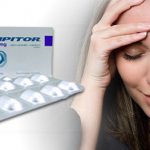Side Effects Of Lipitor In The Elderly

As you age, even though you may have taken a medication for decades, your body may react differently to it later in life. One reason for this is that your metabolism has slowed down. Some medicines need to be processed by your liver to benefit your health; slower digestion and liver function mean it may take longer for a drug to get into your bloodstream. Later, remnants of the medicine need to be eliminated from your body by the liver and kidneys. Slowdowns at this stage mean it may take longer for a drug to leave your body, so its effects last longer.
Studies also show that certain medications are less safe for older people, and it is important that you work with your provider or pharmacist to use medications that are safe for your age. The American Geriatrics Society’s Beers Criteria lists medications that may not be safe in older people and can be used as a tool when you talk with your provider or pharmacist about using safe medications.
High cholesterol is well known as a risk factor for heart disease. Surprisingly, though, some research has shown that high cholesterol does not increase the risk of dying from heart disease in elderly people. Many people who have high cholesterol die from complications of heart disease before reaching an advanced age. Those who live into their 70s or 80s despite high cholesterol might have other factors that increased their longevity.
What is Lipitor?
Lipitor is a prescription medicine that lowers cholesterol in the blood. It lowers the LDL-C (“bad” cholesterol) and triglycerides in your blood. It can raise your HDL-C (“good” cholesterol) as well. Lipitor is for adults and children over 10 whose cholesterol does not come down enough with exercise and a low-fat diet alone.
Lipitor can lower the risk for heart attack, stroke, certain types of heart surgery, and chest pain in patients who have heart disease or risk factors for heart disease such as age, smoking, high blood pressure, low HDL-C, or heart disease in the family. Lipitor can lower the risk for heart attack or stroke in patients with diabetes and risk factors such as eye problems, kidney problems, smoking, or high blood pressure.
Limitations of Use: Lipitor has not been studied in people who have an increase of chylomicrons (Fredrickson Types I and V).
How should I take Lipitor?
Take Lipitor exactly as prescribed by your doctor. Follow all directions on your prescription label. Your doctor may occasionally change your dose to make sure you get the best results. Do not use this medicine in larger or smaller amounts or for longer than recommended.
Lipitor is usually taken once a day, with or without food. Take the medicine at the same time each day.
Do not break a tablet before taking it, unless your doctor has told you to.
You may need to stop using this medicine for a short time if you have:
• uncontrolled seizures;
• an electrolyte imbalance (such as high or low potassium levels in your blood);
• severely low blood pressure;
• a severe infection or illness; or
• surgery or a medical emergency.
It may take up to 2 weeks before your cholesterol levels improve, and you may need regular blood tests. You may not notice any change in your symptoms, but keep using the medication as directed. Your blood work will help your doctor determine how long to treat you with this medicine. You may need to take Lipitor for a long time or for life depending on your medical history.
Lipitor is only part of a complete treatment program that may also include diet, exercise, and weight control. Follow your doctor’s instructions very closely.
Side Effects Of Lipitor In The Elderly
Statin use in people over 65 years of age is high. A meta-analysis of older patients included in randomized trials found good evidence that statins reduce vascular events and mortality in people with existing coronary heart disease. However, Statins like Lipitor oral tablets can cause several side effects. The FDA warns on statin labels that some people have developed memory loss or confusion while taking statins. These side effects reverse once you stop taking the medication. But in a 2013 review, researchers from Johns Hopkins Medicine looked at 41 different studies on statins to see if there was a link between taking the medication and memory loss. Combined, the studies followed 23,000 men and women with no history of memory problems for up to 25 years.
The researchers found no evidence that using statins caused memory loss or dementia. In fact, there was some evidence that long-term statin use may protect against dementia.
The American Heart Association and the American College of Cardiology recently released new guidelines on statin use. The new guidelines suggest that more people can benefit from statins than previously believed.
They recommend statin treatment for people ages 40 to 75 without heart disease who have a 7.5 percent (or higher) risk of having a heart attack or stroke in the next 10 years.
Your doctor is most likely to prescribe statins if you:
- have a history of heart attack, stroke, or heart disease
- have a high risk of having a heart attack or stroke within 10 years
- are 21 or over with an LDL cholesterol level of 190 mg/dL or higher
- are age 40 to 75 and have diabetes.
Your doctor may do tests to help to determine if you fit into one of these groups. The tests may include measuring your cholesterol levels, blood pressure, or other risk factors.
Here are the possible side effects of Lipitor oral tablets:
More common side effects
Some of the more common side effects that can occur with the use of Lipitor oral tablets include:
• cold symptoms such as runny nose, sneezing, and coughing
• confusion
• diarrhea
• forgetfulness
• gas
• heartburn
• joint pain
• urinary tract infection (UTI).
If these effects are mild, they may go away within a few days or a couple of weeks. If they’re more severe or don’t go away, talk to your doctor or pharmacist.
Serious side effects
Call your doctor right away if you have serious side effects. Call 911 if your symptoms feel life-threatening or if you think you’re having a medical emergency. Serious side effects and their symptoms can include the following:
• Muscle problems. Symptoms can include:
o unexplained muscle weakness, tenderness, or pain
o tiredness
• Liver problems. Symptoms can include:
o tiredness or weakness
o loss of appetite
o upper stomach pain
o dark urine
o yellowing of your skin or the whites of your eyes
• Allergic reaction.
How to cope with Lipitor side effects
What to do about:
• aches and pains in your back and joints – if you get unusual muscle pain, weakness, or tiredness which isn’t from exercise or hard work, talk to your doctor. You may need a blood test to check what might be causing it. You can also ask your pharmacist to recommend a painkiller.
• cold-like symptoms – try taking paracetamol or ibuprofen regularly for a few days. If the symptoms return when you stop taking the painkillers ask your doctor for advice.
• constipation or wind – eat more high-fiber foods such as fresh fruit, vegetables, and cereals, and drink plenty of water. Try to exercise more regularly, for example, by going for a daily walk or run. If this doesn’t help, talk to your pharmacist or doctor.
• diarrhea – drink plenty of water to avoid dehydration. Signs of dehydration include peeing less than usual or having dark, strong-smelling pee.
• feeling sick (nausea) or indigestion – stick to simple meals and do not eat rich or spicy food. It might help to take your atorvastatin after a meal or snack. If you continue to get symptoms of indigestion ask your pharmacist to recommend an antacid. Contact your doctor if your symptoms continue for more than a few days or if they get worse.
• headaches – make sure you rest and drink plenty of fluids. Do not drink too much alcohol. Ask your pharmacist to recommend a painkiller. Headaches should usually go away after the first week of taking atorvastatin. Talk to your doctor if they last longer than a week or are severe.
• nosebleeds – try applying a thin layer of Vaseline to the inside edges of your nose.
• sore throat – try gargling with warm salty water (children shouldn’t try this), or use paracetamol or ibuprofen to ease any pain or discomfort. If the symptoms last longer than a week ask your pharmacist or doctor for advice.





